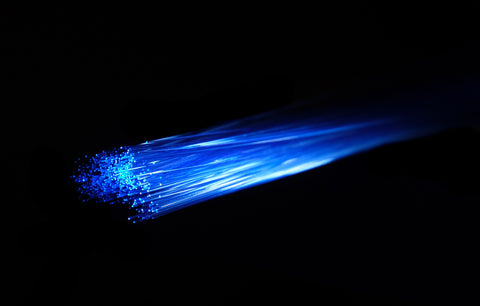Fiber optic cables — A complete guide

Fiber optic cables are wires used mostly for Internet data transmission, offering better performance than wiring alternatives made of metal. Because of the unique capabilities fiber optic provides, these cables are becoming a go-to wiring choice for certain applications.
What is optical fiber?
A fiber optics cable features technology for data transmission that is used in the wiring industry. It implies the transmission of light pulses via a long fiber, which makes up a part of the cable construction.
The fiber is usually made of glass or plastic. For optical cable communication, fiberoptic cable made of metal is not used because it offers a higher power loss and exposes the signal to electromagnetic interference, which makes it weaker.
The fibers that make up optical fiber wiring are extremely thin, in fact, thinner than human hair by several times. The optical fibers consist of two parts, the core, and the cladding. The core is the part that light pulses go through, while the cladding is wrapped around the core. The core is usually made of glass, and the cladding is usually made of plastic or glass.
Applications of fiber optic cables
The go-to application of fiber optic cables is long-distance fast data and communication networks, which means that the installation of fiber cable is outdoor.
Fiber optic HDMI cables have become the go-to choice for these applications because of the speed of data transmission it provides. Fiber optic HDMI cable is most often used for Internet connection and smart TV. Sometimes it can also be used for phone communications.
Besides these major applications, fiber optics can also be used for LED lighting in home decor and even vehicles. Fiber optic HDMI is also used across various industries, such as in medical devices and diverse sensors.
How do fiber optic cables transmit data?
Optical fiber transmits data through pulses of light that travel through the core of the wire. While traveling, it bounces off the wire’s walls. In such a way, the information is transmitted through an internal reflection of light, which occurs within the fiber optic wire. Since there are many strands made of optical fiber in a single wire, the signal travels to the destination extremely fast.
The pulses of light traveling through fiber optic cabling transmit data that is binary, which is the kind of data that displays anything we see on the Internet. Binary data, made of bits, consists of 1’s and 0’s that are organized in bytes, containing 8 bits each. These can be easily translated into pulses — a pulse for 1 and no pulse for 0.
There are single-mode and multi-mode optical fiber wires. The single-mode fiber is the type used to transmit data over long distances. Multi-mode fiber, in turn, is used for data transmission over short distances.
While optical fibers are used to transmit Internet data, you can’t use the wiring to get your Internet connection directly. Instead, when the data reaches the destination, the light pulses need to be converted into electrical Ethernet or Coax through an optical network terminal (ONT). This is called last-mile fiber.
The last-mile fiber stands for different fiber optic connectors that exist between your Internet service provider and your home. At this point, the final Internet connection to your place can be provided via either fiber or copper wire, which depends on the technical compatibility of your network provider’s facilities.
Buying fiber optic cables
Nassau National Cable is a fiber optic products supplier and offers various fiber optic cable types, so you can find the right wiring for your project at our professional electrical wiring store. Here is our fiber optic line of products:
If you’re still deciding on which type of fiber optic cable is the right one for you, reach out to our team for a consultation.

















